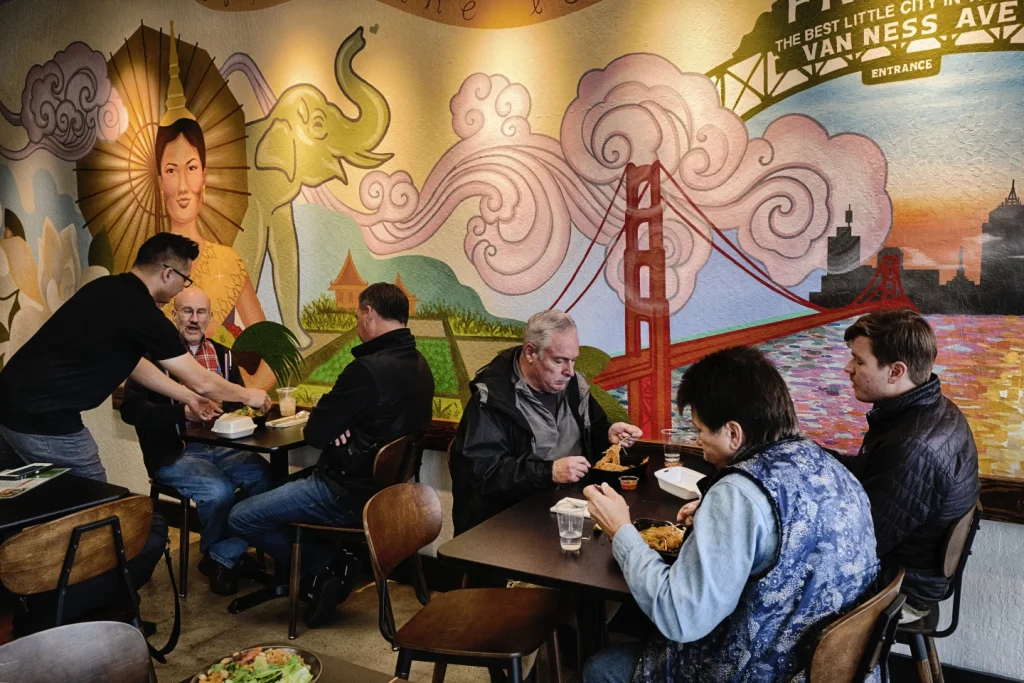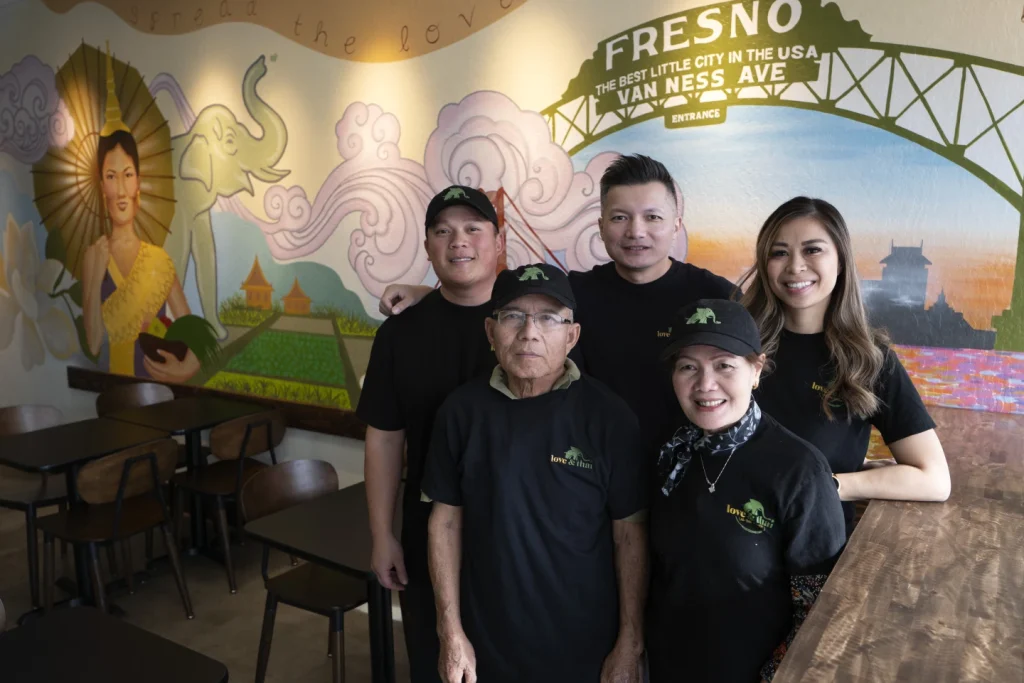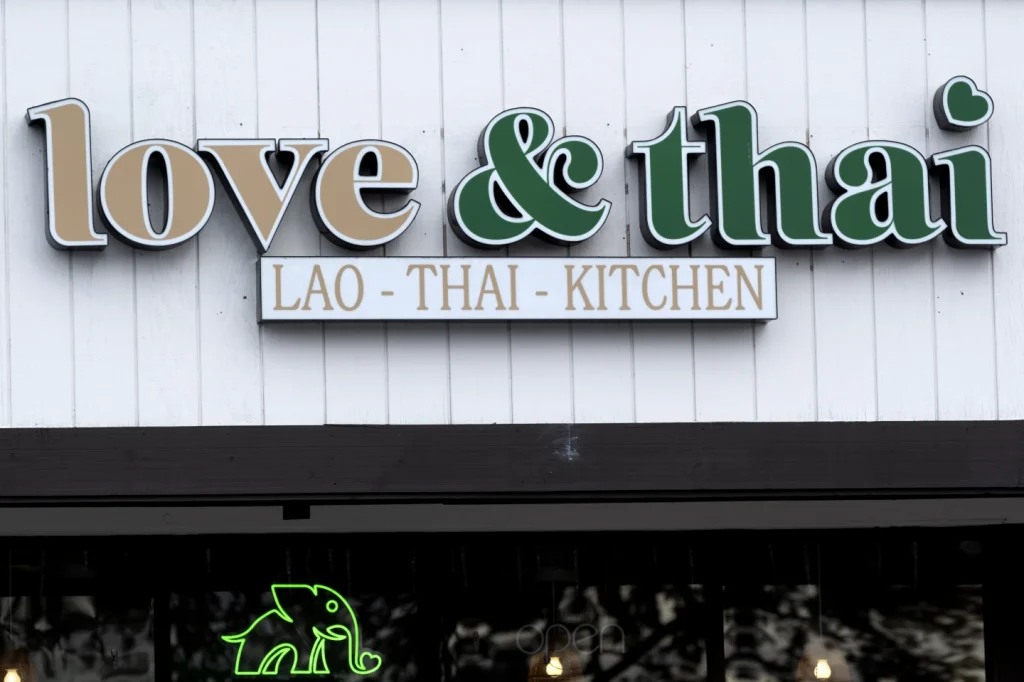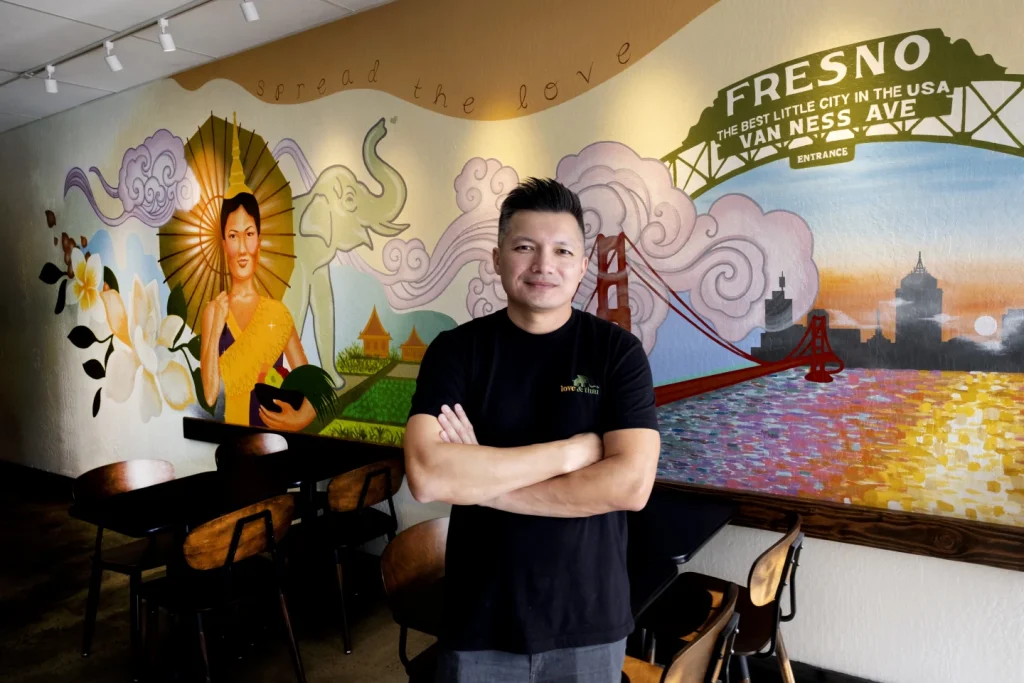In the heart of Fresno, California, a beacon of cultural pride shines brightly through the doors of Love & Thai restaurant.
David Rasavong, the proprietor, has woven his rich heritage into every aspect of the establishment, from the heartfelt family portraits adorning the walls to the captivating mural that chronicles his family’s odyssey from Laos to the Golden State.
The menu, a testament to his roots, boasts a tantalizing array of Lao and Thai delicacies, including the delectable Nam Khao, a crispy coconut rice salad, and the aromatic Pad See Ew, a stir-fried rice noodle dish.
However, the journey of Love & Thai has not been without its trials. A baseless and malicious accusation, steeped in racist stereotypes about Asian cuisine, shook the very foundations of the restaurant.
The insidious rumor, perpetuated by a misguided individual, falsely alleged that the restaurant was serving dog meat, unleashing a torrent of vitriolic harassment that forced Rasavong to shutter the doors of his previous location out of concern for his family’s safety.
This ordeal, a harrowing testament to the enduring specter of discrimination and prejudice, cast a dark shadow over the resilience of Love & Thai.
The insidious nature of the harassment, fueled by unfounded allegations and racial bias, underscores the pervasive challenges faced by individuals and communities of Asian and Pacific Islander descent.
The distressing episode serves as a poignant reminder of the urgent need to confront and dismantle the harmful stereotypes and misinformation that continue to plague AAPI communities.
It is a call to action to dispel the pernicious myths that perpetuate the notion of Asian food as “dirty,” “weird,” or “exotic.”
Amidst the adversity, there exists a glimmer of hope—a hope that stems from the unwavering resilience and determination of individuals like David Rasavong.
In the wake of the pandemic-fueled surge in anti-Asian hostilities, AAPI communities have galvanized efforts to reclaim the narrative surrounding their culinary heritage.
They have sought to dismantle the damaging misconceptions and foster a deeper understanding and appreciation for the rich tapestry of flavors and traditions that define Asian cuisine.
The burgeoning appetite for knowledge about the diverse culinary landscape of the Asian diaspora has emerged as a beacon of optimism.
Across traditional and digital media platforms, there has been a palpable surge in interest and curiosity about the intricacies of Asian cuisine.
This burgeoning curiosity represents a pivotal shift—a shift towards a more nuanced and enlightened perspective that transcends the confines of stereotypes and embraces the multifaceted beauty of Asian culinary traditions.
In the face of adversity, Love & Thai stands as a testament to the indomitable spirit of cultural pride and resilience.

It serves as a poignant reminder of the enduring power of heritage and the unwavering determination to overcome adversity.
The journey of Love & Thai encapsulates the profound significance of preserving and celebrating cultural identity in the face of adversity, and it stands as a testament to the transformative power of resilience and hope.
As we reflect on the story of Love & Thai, we are reminded of the imperative to stand in solidarity with AAPI communities, to amplify their voices, and to challenge the insidious forces of prejudice and discrimination.
It is a call to action to embrace diversity, to celebrate cultural heritage, and to forge a more inclusive and equitable future for all.
In the enduring resilience of Love & Thai, we find a beacon of hope—a hope that transcends adversity and paves the way for a brighter, more compassionate world.
The story of Rasavong’s journey through adversity and triumph is a testament to the power of community support and resilience.
Despite facing initial skepticism and challenges, Rasavong found himself surrounded by individuals who believed in his vision and were willing to offer their expertise and services to help him succeed.
The offer from a shopping center property manager to take over a vacated suite, the pro bono services of a graphic designer and an interior designer, and the artistic contribution of a local artist all played pivotal roles in the transformation of Love & Thai.
The outpouring of support culminated in a successful grand opening, with the bustling atmosphere and the city’s proclamation serving as affirmations of Rasavong’s determination and the community’s backing.
Rasavong’s unwavering belief in the purpose behind his journey reflects a profound resilience and optimism.
Despite the challenges he faced, he remains committed to the path he has chosen, demonstrating a remarkable strength of character and determination to overcome adversity.
The historical context provided by Robert Ku sheds light on the cultural complexities surrounding the consumption of dog meat.
The practice, which has existed in various parts of the world for centuries, has been intertwined with cultural perceptions and stereotypes.

Ku’s insights into the historical references to dog meat consumption by different cultures, as well as the association of such practices with Chinese immigrants in the United States, offer a thought-provoking perspective on the cultural politics of food and the perpetuation of stereotypes.
Ku’s observations regarding the blurring of Asian identities and the tendency to homogenize diverse Asian cultures underscore the importance of recognizing and respecting the unique heritage and traditions of each Asian community.
The perpetuation of stereotypes and misconceptions can have far-reaching implications, contributing to a lack of understanding and appreciation for the rich and diverse cultural tapestry of Asia.
In conclusion, Rasavong’s journey serves as an inspiring example of resilience and the transformative power of community support.
His unwavering belief in his purpose and the outpouring of support from individuals who rallied behind him exemplify the strength that can be found in unity and solidarity.
Additionally, Robert Ku’s insights shed light on the complex cultural dynamics surrounding food and identity, emphasizing the need for nuanced understanding and respect for diverse cultural traditions.
As we navigate the complexities of cultural perceptions and stereotypes, it is essential to foster an environment of acceptance and appreciation for the richness and diversity of Asian cultures.
The false allegation of eating dog meat has been a source of discrimination and disgust for Asian Americans and Pacific Islanders for generations.
When they bring their cultural foods to public spaces like school or work, they often face negative reactions from others.
However, in recent years, there has been a pushback against this discrimination, with individuals and communities taking steps to fight back and celebrate their heritage.
One example of this pushback is the self-published book “Lunchbox Moments,” which was created by San Francisco-Bay Area-based writers Diann Leo-Omine, Anthony Shu, and Shirley Huey.
The book is a compilation of over two dozen personal essays and illustrations that raised $6,000 for charity.
According to Leo-Omine, the project became “a powerful thing for all of us,” as it aimed to show that cultural identity is not always about assimilation and that moments of joy can be found in embracing one’s heritage. The hope is that the book will open people’s minds and encourage them to try new foods.
In addition to initiatives like “Lunchbox Moments,” there has been a surge in the representation of Asian cuisine in publishing and food media.

Publishers Weekly dedicated a feature to Chinese and Taiwanese food, highlighting nine new cookbooks on the subjects.
These cookbooks, authored by individuals who grew up outside of Asia, offer a range of titles, from “Vegan Chinese Food” to “Kung Food” and “A Very Chinese Cookbook.”
Children’s book author Grace Lin also released “Chinese Menu,” which explores the folklore behind favorite Chinese American dishes.
These books not only provide recipes but also share personal anecdotes, adding a personal touch that resonates with readers.
The growing Asian diaspora has resulted in a diverse range of regional cuisines and nuances, leading to a wealth of cookbooks that cater to different tastes and preferences.
Publishers have recognized the market for these books and are capitalizing on the demand for culturally rich and diverse culinary content.
This trend not only celebrates Asian cuisine but also serves as a reminder of the cultural diversity within the Asian community.
Despite the progress being made, challenges still persist. For example, at Love & Thai, a restaurant run by an Asian American, the owner, Rasavong, has faced insensitive jokes and comments that have crossed the line.
He hopes that his experience will prompt others to think before they speak and consider the impact of their words.
In conclusion, the fight against discrimination and the celebration of Asian cuisine and culture is an ongoing journey.

Initiatives like “Lunchbox Moments” and the surge in Asian cuisine representation in publishing and food media are steps in the right direction.
However, it is important to continue challenging stereotypes and promoting understanding and appreciation for the rich and diverse cultures within the Asian American and Pacific Islander community.
